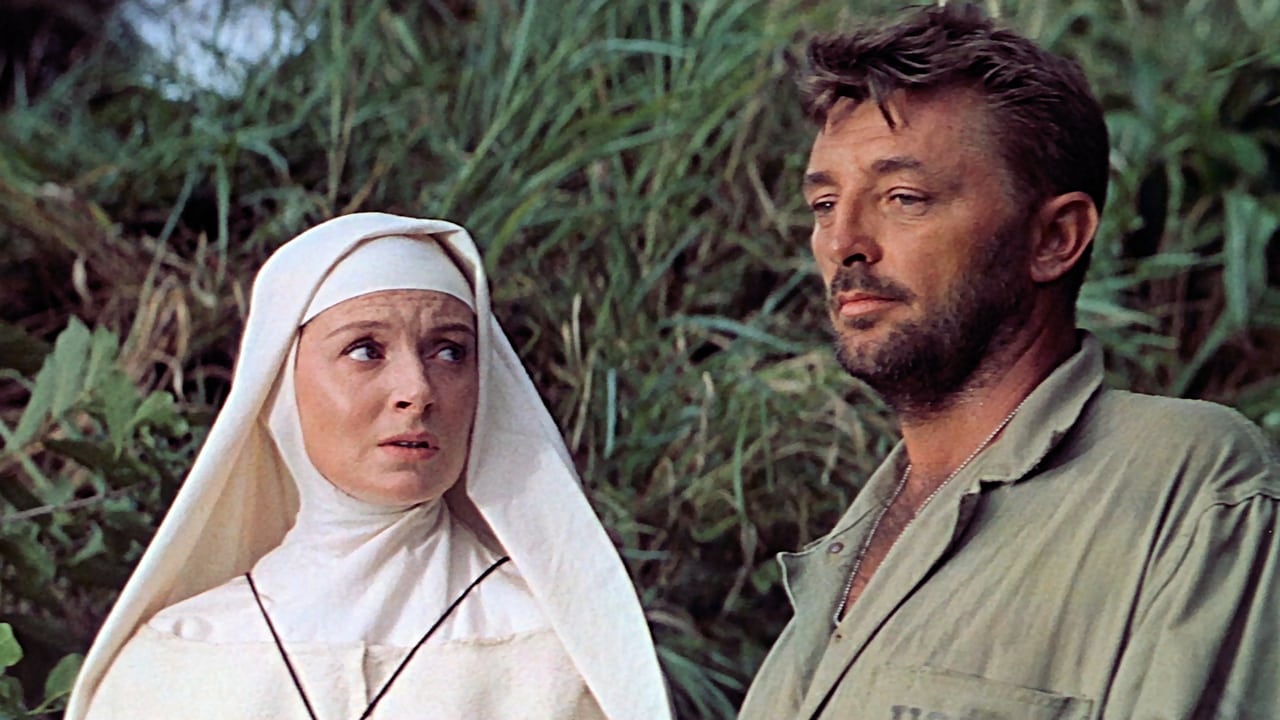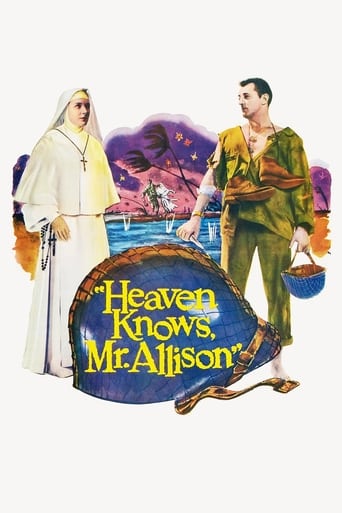Redwarmin
This movie is the proof that the world is becoming a sick and dumb place
Cleveronix
A different way of telling a story
Mischa Redfern
I didn’t really have many expectations going into the movie (good or bad), but I actually really enjoyed it. I really liked the characters and the banter between them.
Leoni Haney
Yes, absolutely, there is fun to be had, as well as many, many things to go boom, all amid an atmospheric urban jungle.
HotToastyRag
One of my favorite screen couples is Deborah Kerr and Robert Mitchum; not only are they darling together, but they also liked working with each other in real life! They acted together four times, the first of which was in Heaven Knows, Mr. Allison, a fantastic love story from the 1950s.It takes place during the thick of WWII, and it addresses the age-old fantasy of being trapped on a desert island with one person. Lucky for Deborah, she's stranded with hunky marine Robert Mitchum. Unlucky for Bob, Deborah's a nun! Still, during wartime, and when you live through an adventure, you can't help but bond. The two very different characters are drawn together, but you'll have to watch the movie to find out how deep their feelings run.I love this movie, but I also love Robert Mitchum, so if you actively dislike him, you won't buy into the story. Also, you should probably book an appointment with your optometrist. The chemistry between the two leads is fantastic, and it's a true testament to their talents that they're able to carry a two-person movie. I've seen this one twice, and while it's not my all-time favorite romance, it's always very entertaining to watch. After you've watched Heaven Knows, Mr. Allison, check out The Sundowners, where Bob and Deborah are reunited in the Australian outback!
David J. Willmore
I love stories set in WWII, and I enjoy love stories. I also don't think they no longer, mostly, make pictures like they did prior to the 1960's.This films hit the nail on the head for all of my likes, but it could have been a great mess.Two strong characters combine. One is Mr. Mitchum's typical dark protagonist hero. He is rough, from a rough life, but with a heart of gold. Kerr is a novitiate that would be a nun if the war had not intervened. She is strong and saintly kind. Most believably Mitchum's character falls in love with Kerr's character as they struggle to survive as two against the Japanese enemy and more.The chemistry between the two is dynamic and strong. I found myself hoping Mitchum's character could steal the nun away. The tension between the two and their struggle to stay alive.This is really a love story set in WWII and not a WWII story with a love story. If you want to feel the magical romantic love of days gone by pick up this film. At the very least watch the free for Amazon Prime members show.
pierre-luthier
When you see that a movie has John Huston as a director, you want to see it.I thought that was true till I saw Heaven knows Mr Allison. I was deeply disappointed and maybe angry after seeing it. I thought it was a cheap advertisement for US navy and for catholicism. I was doubting all movie long if it was ironical, because the nun and mitchum were so caricatured. Of course it is well filmed. Of course the actors are good, even brilliant.But the scenario has a toltal lack of impartiality. I m sorry but I can recommend this movie to no one unless you re a stubborn militar or a non-open minded catholic. PS: I am catholic
LouE15
What a very pleasant surprise, watching this film on TV recently for the first time. It's a simple, well-made story of two shipwrecked characters during wartime. How they get on – practically, emotionally – is offset by a host of ingredients – WWII, the Japanese, the protagonists' respective professions – which make the story infinitely more interesting. The actors are good enough to show that each character has an inner life – this is tremendously important and elevates the film above standard wartime adventures or romances. There are obvious comparisons to be made – to 'The African Queen' and to 'Hell in the Pacific' in particular – but this is good enough in every respect to stand on its own. I'm beginning to understand why the 1950s are referred to as a Golden Age for Hollywood. "Anastasia", "The Inn of the Sixth Happiness", much of Hitchcock's output, "The Journey" – all great 1950s films."Heaven Knows, Mr Allison" is really all about the interaction, the inner and outer life, between two people who didn't choose to be where they are (stranded on an island in the thick of danger), but make the best of it: Robert Mitchum's marine, Corporal Allison, a practical, man's man, rough and tough but with a good heart; and Deborah Kerr's nun, Sister Angela, whose motivations are more opaque, but who shows nevertheless a soldier's resilience. Corporal Allison knows pretty well what he is and is not: he's not 'nice' but he is good at his job. * * Spoilers from here ** The trouble is, so is she: she's a good nun. Not even the periodic reappearance of the Japanese could have prevented this from becoming a 'lovers on the windswept beach' story had it not been for this important fact. His good heart, and her job, keep the sexual subtext submerged. Both actors have 'complicated' faces in addition to proved acting skill, in a story that in weaker hands would have been all batting eyelashes, heaving chests and sweaty stares, a second-rate doctor-nurse romance. I agree with other reviewers that you don't learn nearly as much literal information about her – her profession, her place in it – as you do about him. But Kerr's skill is that you do still learn quite a bit – what there is to know you can find from her energetic embracing of the practical difficulties of their temporary life together; from her silence when he is speaking; from her looks (at him, away from him). She's brave: she isn't defensive; she doesn't shrink; and when she does it's not from him; but from the ugly reality his words force in front of her.I was intrigued to read from another reviewer that the book on which the story is based brought the subtext very much into the plot: uptight 1950s Hollywood wasn't going to have any of that. But in fact I think the restraint for once improves the film. It would have been so facile and predictable for poor old Sister Angela to follow the leanings of practicality (boring but true!) and her own liking for her fellow castaway, and give up her vocation for the comfort of life in the arms of that big, handsome, happy man. But as anyone who has seen "The Nun's Story" (- another great 1950s film!) knows, being a nun involves strength on a military scale; and it's this that she draws on – that they both draw on – to survive their inclinations. It is survival in every sense; survival of desire. The shot of her without her veil is extraordinary. Allison is wordlessly more attracted to her than ever when he sees her calmly accepting the practicality that he has had to remove her clothing – that crucial symbol of her faith. Had either acted on their inclinations, could they have survived the boat trip out of there? Unlikely (see the original book of "The African Queen"!). The beauty of this ending is that you suspect it won't matter. They have an inner life, these people – a faith strengthened through what newspapers would call today "their ordeal". His not taking her in his arms; her not ripping off her veil and her ring; their not walking into the sunset arm in arm – these things don't matter. What matters is her faith; his being a soldier – surrounded, at the end, by soldiers. And that's why this film is, besides being an enjoyable adventure story, a highly respectful and intelligent view of both professions, a credit to all involved.

